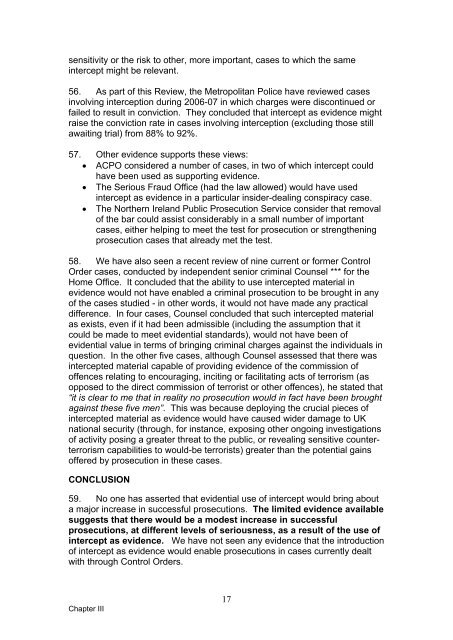Privy Council Review of intercept as evidence: report - Official ...
Privy Council Review of intercept as evidence: report - Official ...
Privy Council Review of intercept as evidence: report - Official ...
You also want an ePaper? Increase the reach of your titles
YUMPU automatically turns print PDFs into web optimized ePapers that Google loves.
sensitivity or the risk to other, more important, c<strong>as</strong>es to which the same<br />
<strong>intercept</strong> might be relevant.<br />
56. As part <strong>of</strong> this <strong>Review</strong>, the Metropolitan Police have reviewed c<strong>as</strong>es<br />
involving <strong>intercept</strong>ion during 2006-07 in which charges were discontinued or<br />
failed to result in conviction. They concluded that <strong>intercept</strong> <strong>as</strong> <strong>evidence</strong> might<br />
raise the conviction rate in c<strong>as</strong>es involving <strong>intercept</strong>ion (excluding those still<br />
awaiting trial) from 88% to 92%.<br />
57. Other <strong>evidence</strong> supports these views:<br />
ACPO considered a number <strong>of</strong> c<strong>as</strong>es, in two <strong>of</strong> which <strong>intercept</strong> could<br />
have been used <strong>as</strong> supporting <strong>evidence</strong>.<br />
The Serious Fraud Office (had the law allowed) would have used<br />
<strong>intercept</strong> <strong>as</strong> <strong>evidence</strong> in a particular insider-dealing conspiracy c<strong>as</strong>e.<br />
The Northern Ireland Public Prosecution Service consider that removal<br />
<strong>of</strong> the bar could <strong>as</strong>sist considerably in a small number <strong>of</strong> important<br />
c<strong>as</strong>es, either helping to meet the test for prosecution or strengthening<br />
prosecution c<strong>as</strong>es that already met the test.<br />
58. We have also seen a recent review <strong>of</strong> nine current or former Control<br />
Order c<strong>as</strong>es, conducted by independent senior criminal Counsel *** for the<br />
Home Office. It concluded that the ability to use <strong>intercept</strong>ed material in<br />
<strong>evidence</strong> would not have enabled a criminal prosecution to be brought in any<br />
<strong>of</strong> the c<strong>as</strong>es studied - in other words, it would not have made any practical<br />
difference. In four c<strong>as</strong>es, Counsel concluded that such <strong>intercept</strong>ed material<br />
<strong>as</strong> exists, even if it had been admissible (including the <strong>as</strong>sumption that it<br />
could be made to meet evidential standards), would not have been <strong>of</strong><br />
evidential value in terms <strong>of</strong> bringing criminal charges against the individuals in<br />
question. In the other five c<strong>as</strong>es, although Counsel <strong>as</strong>sessed that there w<strong>as</strong><br />
<strong>intercept</strong>ed material capable <strong>of</strong> providing <strong>evidence</strong> <strong>of</strong> the commission <strong>of</strong><br />
<strong>of</strong>fences relating to encouraging, inciting or facilitating acts <strong>of</strong> terrorism (<strong>as</strong><br />
opposed to the direct commission <strong>of</strong> terrorist or other <strong>of</strong>fences), he stated that<br />
“it is clear to me that in reality no prosecution would in fact have been brought<br />
against these five men”. This w<strong>as</strong> because deploying the crucial pieces <strong>of</strong><br />
<strong>intercept</strong>ed material <strong>as</strong> <strong>evidence</strong> would have caused wider damage to UK<br />
national security (through, for instance, exposing other ongoing investigations<br />
<strong>of</strong> activity posing a greater threat to the public, or revealing sensitive counterterrorism<br />
capabilities to would-be terrorists) greater than the potential gains<br />
<strong>of</strong>fered by prosecution in these c<strong>as</strong>es.<br />
CONCLUSION<br />
59. No one h<strong>as</strong> <strong>as</strong>serted that evidential use <strong>of</strong> <strong>intercept</strong> would bring about<br />
a major incre<strong>as</strong>e in successful prosecutions. The limited <strong>evidence</strong> available<br />
suggests that there would be a modest incre<strong>as</strong>e in successful<br />
prosecutions, at different levels <strong>of</strong> seriousness, <strong>as</strong> a result <strong>of</strong> the use <strong>of</strong><br />
<strong>intercept</strong> <strong>as</strong> <strong>evidence</strong>. We have not seen any <strong>evidence</strong> that the introduction<br />
<strong>of</strong> <strong>intercept</strong> <strong>as</strong> <strong>evidence</strong> would enable prosecutions in c<strong>as</strong>es currently dealt<br />
with through Control Orders.<br />
Chapter III<br />
17
















